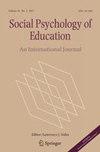成就目标、自我效能感和心理弹性是学习投入的前因
IF 3.2
2区 心理学
Q1 PSYCHOLOGY, EDUCATIONAL
引用次数: 0
摘要
本研究调查了个人资源(即自我效能感和心理灵活性)和成就目标是否会影响学习投入度。本研究共邀请了 223 名法国人文和社会科学专业的一年级学生填写了一份在线问卷,其中包括测量这三个预测因素的量表。回归分析结果表明,43.3%的学习投入度变异是由自我效能感、心理灵活性和成就目标预测的,这意味着这三个因素可以作为促进学习投入度的杠杆。本文章由计算机程序翻译,如有差异,请以英文原文为准。
Achievement goals, self-efficacy, and psychological flexibility as antecedent of study engagement
The present study investigated whether study engagement is predicted by personal resources (i.e., self-efficacy and psychological flexibility) and achievement goals. A total of 223 French first-year humanities and social sciences students were invited to complete an online questionnaire comprising scales measuring the three predictors. The results of regression analyses showed that 43.3% of the variance in study engagement was predicted by self-efficacy, psychological flexibility, and achievement goals, implying that these three factors could be used as levers to promote study engagement.
求助全文
通过发布文献求助,成功后即可免费获取论文全文。
去求助
来源期刊

Social Psychology of Education
PSYCHOLOGY, EDUCATIONAL-
CiteScore
5.40
自引率
3.40%
发文量
59
期刊介绍:
The field of social psychology spans the boundary between the disciplines of psychology and sociology and has traditionally been associated with empirical research. Many studies of human behaviour in education are conducted by persons who identify with social psychology or whose work falls into the social psychological ambit. Several textbooks have been published and a variety of courses are being offered on the `social psychology of education'', but no journal has hitherto appeared to cover the field. Social Psychology of Education fills this gap, covering a wide variety of content concerns, theoretical interests and research methods, among which are: Content concerns: classroom instruction decision making in education educational innovation concerns for gender, race, ethnicity and social class knowledge creation, transmission and effects leadership in schools and school systems long-term effects of instructional processes micropolitics of schools student cultures and interactions teacher recruitment and careers teacher- student relations Theoretical interests: achievement motivation attitude theory attribution theory conflict management and the learning of pro-social behaviour cultural and social capital discourse analysis group dynamics role theory social exchange theory social transition social learning theory status attainment symbolic interaction the study of organisations Research methods: comparative research experiments formal observations historical studies literature reviews panel studies qualitative methods sample surveys For social psychologists with a special interest in educational matters, educational researchers with a social psychological approach.
 求助内容:
求助内容: 应助结果提醒方式:
应助结果提醒方式:


